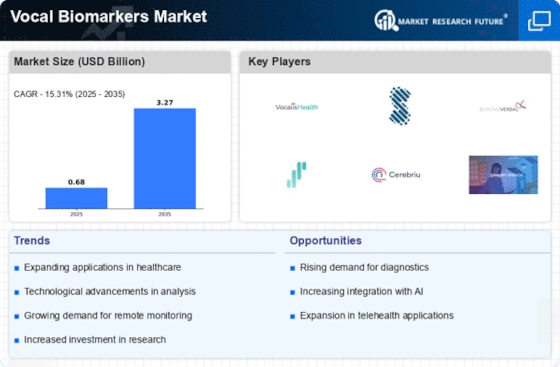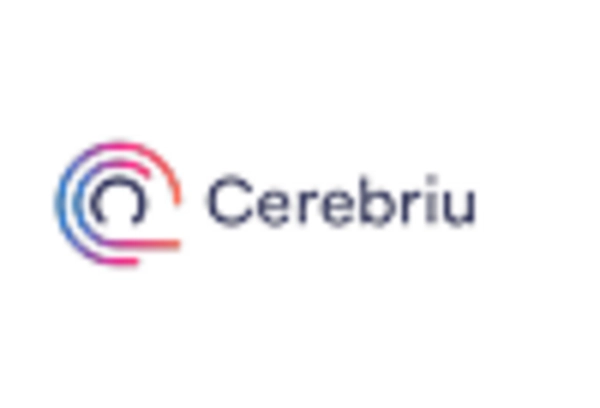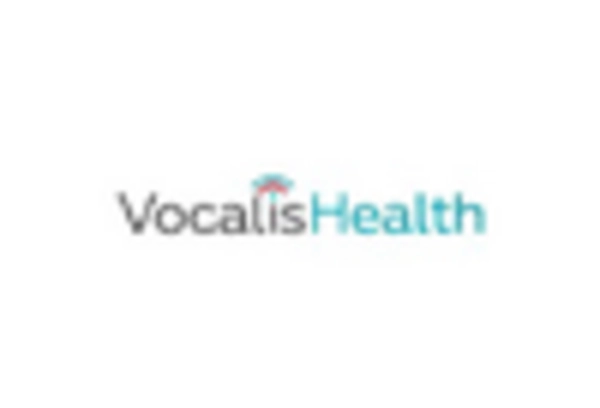Frequency
Amplitude
Error Rate
Vocal Rise Or Fall Time
Phonation Time
Voice Tremor
Pitch
Others
Hospitals & Clinics
Academic & Research
Others
Psychiatric Disorders
Depression
Attention Deficit & Disruptive Behavior Disorders
Others
Neurological Disorders
Parkinson's Disease (PD)
Alzheimer's Disease
Huntington's Disease
Others
Respiratory Disorders
Cardiovascular Disorders
Traumatic Brain Injury (TBI)
Others
Vocal Biomarkers Market by TypeFrequency
Amplitude
Error Rate
Vocal Rise Or Fall Time
Phonation Time
Voice Tremor
Pitch
Others
Vocal Biomarkers Market by End-UserHospitals & Clinics
Academic & Research
Others
Vocal Biomarkers Market by VerticalsPsychiatric Disorders
Depression
Attention Deficit & Disruptive Behavior Disorders
Others
Neurological Disorders
Parkinson's Disease (PD)
Alzheimer's Disease
Huntington's Disease
Others
Respiratory Disorders
Cardiovascular Disorders
Traumatic Brain Injury (TBI)
Others
Vocal Biomarkers Market by TypeFrequency
Amplitude
Error Rate
Vocal Rise Or Fall Time
Phonation Time
Voice Tremor
Pitch
Others
Vocal Biomarkers Market by End-UserHospitals & Clinics
Academic & Research
Others
Vocal Biomarkers Market by VerticalsPsychiatric Disorders
Depression
Attention Deficit & Disruptive Behavior Disorders
Others
Neurological Disorders
Parkinson's Disease (PD)
Alzheimer's Disease
Huntington's Disease
Others
Respiratory Disorders
Cardiovascular Disorders
Traumatic Brain Injury (TBI)
Others
Vocal Biomarkers Market by TypeFrequency
Amplitude
Error Rate
Vocal Rise Or Fall Time
Phonation Time
Voice Tremor
Pitch
Others
Vocal Biomarkers Market by End-UserHospitals & Clinics
Academic & Research
Others
Vocal Biomarkers Market by VerticalsPsychiatric Disorders
Depression
Attention Deficit & Disruptive Behavior Disorders
Others
Neurological Disorders
Parkinson's Disease (PD)
Alzheimer's Disease
Huntington's Disease
Others
Respiratory Disorders
Cardiovascular Disorders
Traumatic Brain Injury (TBI)
Others
Vocal Biomarkers Market by TypeFrequency
Amplitude
Error Rate
Vocal Rise Or Fall Time
Phonation Time
Voice Tremor
Pitch
Others
Vocal Biomarkers Market by End-UserHospitals & Clinics
Academic & Research
Others
Vocal Biomarkers Market by VerticalsPsychiatric Disorders
Depression
Attention Deficit & Disruptive Behavior Disorders
Others
Neurological Disorders
Parkinson's Disease (PD)
Alzheimer's Disease
Huntington's Disease
Others
Respiratory Disorders
Cardiovascular Disorders
Traumatic Brain Injury (TBI)
Others
Germany Outlook (USD Billion, 2018-2032)
Vocal Biomarkers Market by TypeFrequency
Amplitude
Error Rate
Vocal Rise Or Fall Time
Phonation Time
Voice Tremor
Pitch
Others
Vocal Biomarkers Market by End-UserHospitals & Clinics
Academic & Research
Others
Vocal Biomarkers Market by VerticalsPsychiatric Disorders
Depression
Attention Deficit & Disruptive Behavior Disorders
Others
Neurological Disorders
Parkinson's Disease (PD)
Alzheimer's Disease
Huntington's Disease
Others
Respiratory Disorders
Cardiovascular Disorders
Traumatic Brain Injury (TBI)
Others
Vocal Biomarkers Market by TypeFrequency
Amplitude
Error Rate
Vocal Rise Or Fall Time
Phonation Time
Voice Tremor
Pitch
Others
Vocal Biomarkers Market by VerticalsPsychiatric Disorders
Depression
Attention Deficit & Disruptive Behavior Disorders
Others
Neurological Disorders
Parkinson's Disease (PD)
Alzheimer's Disease
Huntington's Disease
Others
Respiratory Disorders
Cardiovascular Disorders
Traumatic Brain Injury (TBI)
Others
Psychiatric Disorders
Depression
Attention Deficit & Disruptive Behavior Disorders
Others
Neurological Disorders
Parkinson's Disease (PD)
Alzheimer's Disease
Huntington's Disease
Others
Respiratory Disorders
Cardiovascular Disorders
Traumatic Brain Injury (TBI)
Others
Vocal Biomarkers Market by End-UserHospitals & Clinics
Academic & Research
Others
Vocal Biomarkers Market by TypeFrequency
Amplitude
Error Rate
Vocal Rise Or Fall Time
Phonation Time
Voice Tremor
Pitch
Others
Vocal Biomarkers Market by End-UserHospitals & Clinics
Academic & Research
Others
Vocal Biomarkers Market by VerticalsPsychiatric Disorders
Depression
Attention Deficit & Disruptive Behavior Disorders
Others
Neurological Disorders
Parkinson's Disease (PD)
Alzheimer's Disease
Huntington's Disease
Others
Respiratory Disorders
Cardiovascular Disorders
Traumatic Brain Injury (TBI)
Others
Vocal Biomarkers Market by TypeFrequency
Amplitude
Error Rate
Vocal Rise Or Fall Time
Phonation Time
Voice Tremor
Pitch
Others
Vocal Biomarkers Market by End-UserHospitals & Clinics
Academic & Research
Others
Vocal Biomarkers Market by VerticalsPsychiatric Disorders
Depression
Attention Deficit & Disruptive Behavior Disorders
Others
Neurological Disorders
Parkinson's Disease (PD)
Alzheimer's Disease
Huntington's Disease
Others
Respiratory Disorders
Cardiovascular Disorders
Traumatic Brain Injury (TBI)
Others
Vocal Biomarkers Market by TypeFrequency
Amplitude
Error Rate
Vocal Rise Or Fall Time
Phonation Time
Voice Tremor
Pitch
Others
Vocal Biomarkers Market by End-UserHospitals & Clinics
Academic & Research
Others
Vocal Biomarkers Market by VerticalsPsychiatric Disorders
Depression
Attention Deficit & Disruptive Behavior Disorders
Others
Neurological Disorders
Parkinson's Disease (PD)
Alzheimer's Disease
Huntington's Disease
Others
Respiratory Disorders
Cardiovascular Disorders
Traumatic Brain Injury (TBI)
Others
Vocal Biomarkers Market by TypeFrequency
Amplitude
Error Rate
Vocal Rise Or Fall Time
Phonation Time
Voice Tremor
Pitch
Others
Vocal Biomarkers Market by End-UserHospitals & Clinics
Academic & Research
Others
Vocal Biomarkers Market by VerticalsPsychiatric Disorders
Depression
Attention Deficit & Disruptive Behavior Disorders
Others
Neurological Disorders
Parkinson's Disease (PD)
Alzheimer's Disease
Huntington's Disease
Others
Respiratory Disorders
Cardiovascular Disorders
Traumatic Brain Injury (TBI)
Others
Vocal Biomarkers Market by TypeFrequency
Amplitude
Error Rate
Vocal Rise Or Fall Time
Phonation Time
Voice Tremor
Pitch
Others
Vocal Biomarkers Market by End-UserHospitals & Clinics
Academic & Research
Others
Vocal Biomarkers Market by VerticalsPsychiatric Disorders
Depression
Attention Deficit & Disruptive Behavior Disorders
Others
Neurological Disorders
Parkinson's Disease (PD)
Alzheimer's Disease
Huntington's Disease
Others
Respiratory Disorders
Cardiovascular Disorders
Traumatic Brain Injury (TBI)
Others
Vocal Biomarkers Market by TypeFrequency
Amplitude
Error Rate
Vocal Rise Or Fall Time
Phonation Time
Voice Tremor
Pitch
Others
Vocal Biomarkers Market by End-UserHospitals & Clinics
Academic & Research
Others
Vocal Biomarkers Market by VerticalsPsychiatric Disorders
Depression
Attention Deficit & Disruptive Behavior Disorders
Others
Neurological Disorders
Parkinson's Disease (PD)
Alzheimer's Disease
Huntington's Disease
Others
Respiratory Disorders
Cardiovascular Disorders
Traumatic Brain Injury (TBI)
Others
Vocal Biomarkers Market by TypeFrequency
Amplitude
Error Rate
Vocal Rise Or Fall Time
Phonation Time
Voice Tremor
Pitch
Others
Vocal Biomarkers Market by VerticalsPsychiatric Disorders
Depression
Attention Deficit & Disruptive Behavior Disorders
Others
Neurological Disorders
Parkinson's Disease (PD)
Alzheimer's Disease
Huntington's Disease
Others
Respiratory Disorders
Cardiovascular Disorders
Traumatic Brain Injury (TBI)
Others
Vocal Biomarkers Market by End-UserHospitals & Clinics
Academic & Research
Others
Vocal Biomarkers Market by TypeFrequency
Amplitude
Error Rate
Vocal Rise Or Fall Time
Phonation Time
Voice Tremor
Pitch
Others
Vocal Biomarkers Market by End-UserHospitals & Clinics
Academic & Research
Others
Vocal Biomarkers Market by VerticalsPsychiatric Disorders
Depression
Attention Deficit & Disruptive Behavior Disorders
Others
Neurological Disorders
Parkinson's Disease (PD)
Alzheimer's Disease
Huntington's Disease
Others
Respiratory Disorders
Cardiovascular Disorders
Traumatic Brain Injury (TBI)
Others
Vocal Biomarkers Market by TypeFrequency
Amplitude
Error Rate
Vocal Rise Or Fall Time
Phonation Time
Voice Tremor
Pitch
Others
Vocal Biomarkers Market by VerticalsPsychiatric Disorders
Depression
Attention Deficit & Disruptive Behavior Disorders
Others
Neurological Disorders
Parkinson's Disease (PD)
Alzheimer's Disease
Huntington's Disease
Others
Respiratory Disorders
Cardiovascular Disorders
Traumatic Brain Injury (TBI)
Others
Vocal Biomarkers Market by End-UserHospitals & Clinics
Academic & Research
Others
Vocal Biomarkers Market by TypeFrequency
Amplitude
Error Rate
Vocal Rise Or Fall Time
Phonation Time
Voice Tremor
Pitch
Others
Vocal Biomarkers Market by VerticalsPsychiatric Disorders
Depression
Attention Deficit & Disruptive Behavior Disorders
Others
Neurological Disorders
Parkinson's Disease (PD)
Alzheimer's Disease
Huntington's Disease
Others
Respiratory Disorders
Cardiovascular Disorders
Traumatic Brain Injury (TBI)
Others
Vocal Biomarkers Market by End-UserHospitals & Clinics
Academic & Research
Others
Vocal Biomarkers Market by TypeFrequency
Amplitude
Error Rate
Vocal Rise Or Fall Time
Phonation Time
Voice Tremor
Pitch
Others
Vocal Biomarkers Market by VerticalsPsychiatric Disorders
Depression
Attention Deficit & Disruptive Behavior Disorders
Others
Neurological Disorders
Parkinson's Disease (PD)
Alzheimer's Disease
Huntington's Disease
Others
Respiratory Disorders
Cardiovascular Disorders
Traumatic Brain Injury (TBI)
Others
Vocal Biomarkers Market by End-UserHospitals & Clinics
Academic & Research
Others
Vocal Biomarkers Market by TypeFrequency
Amplitude
Error Rate
Vocal Rise Or Fall Time
Phonation Time
Voice Tremor
Pitch
Others
Vocal Biomarkers Market by End-UserHospitals & Clinics
Academic & Research
Others
Vocal Biomarkers Market by VerticalsPsychiatric Disorders
Depression
Attention Deficit & Disruptive Behavior Disorders
Others
Neurological Disorders
Parkinson's Disease (PD)
Alzheimer's Disease
Huntington's Disease
Others
Respiratory Disorders
Cardiovascular Disorders
Traumatic Brain Injury (TBI)
Others
Vocal Biomarkers Market by TypeFrequency
Amplitude
Error Rate
Vocal Rise Or Fall Time
Phonation Time
Voice Tremor
Pitch
Others
Vocal Biomarkers Market by End-UserHospitals & Clinics
Academic & Research
Others
Vocal Biomarkers Market by VerticalsPsychiatric Disorders
Depression
Attention Deficit & Disruptive Behavior Disorders
Others
Neurological Disorders
Parkinson's Disease (PD)
Alzheimer's Disease
Huntington's Disease
Others
Respiratory Disorders
Cardiovascular Disorders
Traumatic Brain Injury (TBI)
Others
Vocal Biomarkers Market by TypeFrequency
Amplitude
Error Rate
Vocal Rise Or Fall Time
Phonation Time
Voice Tremor
Pitch
Others
Vocal Biomarkers Market by End-UserHospitals & Clinics
Academic & Research
Others
Vocal Biomarkers Market by VerticalsPsychiatric Disorders
Depression
Attention Deficit & Disruptive Behavior Disorders
Others
Neurological Disorders
Parkinson's Disease (PD)
Alzheimer's Disease
Huntington's Disease
Others
Respiratory Disorders
Cardiovascular Disorders
Traumatic Brain Injury (TBI)
Others


















Leave a Comment